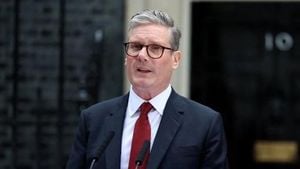Despite significant setbacks for climate science during President Donald Trump’s administration, some experts remain hopeful about the future of climate action. Katharine Hayhoe, climate scientist and chief scientist at the Nature Conservancy, expressed her optimism during recent interviews, highlighting the importance of local actions even as the federal government has withdrawn from global agreements like the Paris Accord.
Hayhoe pointed out, "The clean energy revolution cannot be stopped and no person nor any government can halt climate action. They can slow it down, but they can’t stop it." This perspective is particularly relevant today as discussions around climate change gain more traction within communities across the United States, even amid the political turmoil surrounding climate policies.
One of the alarming trends noted during Trump’s first term was the systematic removal of climate-related information from government websites. For example, NASA’s climate website underwent significant changes, with the word “climate” being stripped from key URLs, impacting public access to scientific data. David Ho, a climate researcher at the University of Hawaiʻi at Mānoa, reported issues accessing necessary resources, stating, “But when I visited, they’re just gone. Sad.” Such changes not only impact researchers but can potentially undermine international collaboration on climate science.
Critics of the Trump administration’s approach assert this trend is part of larger efforts to prioritize fossil fuel interests over scientific integrity. Tyler Norris, another climate expert, noted the removal of important information from energy-related web pages. He lamented, "Mr. Trump signaled on day one to use all available levers to promote fossil fuels," hinting at the administration's inclination to favor deregulation over the scientific consensus on climate change.
The fallout has resulted in deteriorated trust and confidence among scientists. The U.S., historically a leading funder of international climate research, is facing challenges due to these disruptions, exemplified by the removal of documents pertaining to the Paris climate pact from the State Department's website.
Some researchers have noted the adverse effects of freezing grant and loan programs on the scientific community. A report from Nature revealed the chaos within U.S. science following Trump’s executive orders. These decisions delayed funding, stymied research, and contributed to the impression of silencing climate science.
Salient examples of this trend emerged from various scientific institutions. The National Center for Atmospheric Research has undergone scrutiny due to compliance with Trump’s executive orders, leading to the removal of pages and programs related to diversity and inclusion within environmental science.
Responses to the changes highlight the community’s efforts to preserve scientific integrity. Groups focused on archiving material from governmental websites have emerged as key players. The End of Term Web Archive enables the public and other researchers to access previously available climate data. Such initiatives aim to combat the risks posed by the administration’s alterations and removals.
Despite the obstacles, scientists maintain hope. Hayhoe emphasized the compartmentalization of climate issues, noting, "What worries me is those who have least contributed to the problem are those who most suffer from its consequences." She advocates for inclusive conversations about climate change, encouraging people to connect personal experiences with scientific discourse.
The political divide surrounding climate science complicates public perception. A recent Yale study supports Hayhoe’s assertion, showing rising concerns among U.S. citizens largely due to climate-related disasters. The study indicated, “Nowadays, every year there are 30 disasters of [a billion dollars or more]. That is changing public opinion.”
Historically, Trump supporters have voiced skepticism about climate science, often fearing economic repercussions from clean energy transitions. Hayhoe explained, “If you talk about clean energy, about adaptation, natural solutions, the majority of people support it.” She noted the importance of framing climate solutions within local contexts to resonate with communities.
Nevertheless, the challenges persist. The narrative around climate change has soured, largely due to political rhetoric aimed at diminishing the importance of scientific consensus. Trump’s administration has consistently labeled climate change initiatives as “woke,” undermining the significance of climate resilience and adaptation strategies.
Critics of Trump’s policies, including members of the Union of Concerned Scientists, have actively tracked the erosion of science-related oversight during his terms. Their findings have indicated governmental maneuvers to skew or censor climate data and communication. Finucane, from the Union of Concerned Scientists, said, "There are many instances where the administration may have altered or deleted science information on federal websites... This is especially concerning during such chaotic political transitions."
With the upcoming election cycles, the stability of U.S. climate policy hangs precariously. The responses of scientific institutions and communities could provide both parties with lessons learned—how trust can be built through transparency and collaboration, contrasted against the distractions of political agendas.
Hope lies in the ability of local communities and scientists, like Hayhoe, to build bridges between the empirical world of climate change and the human experience. She passionately remarked, "How did we manage to end slavery? How did women get the vote? It wasn’t because of rich people, but rather individuals who came together." This revival of community action may yet prove pivotal in combating the repercussions of governmental disengagement from climate science.
Simply put, the challenges posed by the Trump administration's approach to climate science cannot be ignored, but neither must the important strides made at local levels worldwide as the momentum for climate action continues to strengthen among the public.



